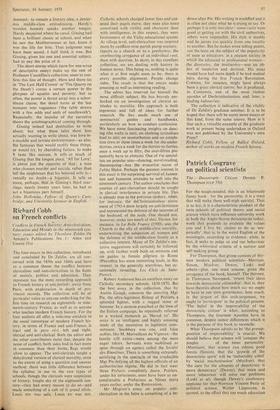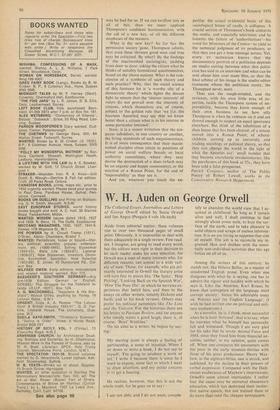Patrick Cosgrave on political scientists
For the tough-minded, this is an hilariously funny book : for the pessimistic, it is a tract that will make them well-nigh suicidal. That is to say, it is a characteristic product of the twin schools of political theory and social science which most influence university work in both the Anglo-Saxon democracies today; work that pretends to evaluate the values you and I live by; claims to do so 'em- pirically'. that is. in the weird English of the sociologist, according to evidence; while, in fact, it seeks to judge us and our behaviour by the whimsical criteria of a narrow and self-seeking group.
For Thompson. that group consists of thir- teen modern political scientists—Merriam. Simon, Maciver, Dewey, Laski and others—plus. one must assume, given the arrogance of the book, himself. The thirteen, in Thompson Newspeak. 'orient their ideas towards democratic citizenship'. that is, they have theories about how much say we ought to have in our own governance; how much, in the jargon of this arch-jargonaut, we ought to 'participate' in the political process. The belief in the improvability of the democratic citizen' is what, according to Thompson. the fourteen Apostles have in common, despite minor differences which it is the purpose of this book to reconcile.
What Thompson admits to be 'the presup- position of improvability' is crucial. We should believe that science will 'conquer the
jungles . . of the inner personality' (Merriam), that science can release good forces (Simon), that the 'growth of the democratic spirit' will be 'ineluctably aided' by 'social mechanisation' (MacIver). that 'the cure for the ailments of democracy is more democracy' (Dewey), that more and more 'education' will solve our problems (Laski et al). though Dewey's cautionary applause for that' Norman Vincent Peale of political science, Walter Lippmann, is quoted, to the effect that too much education
may be bad for us. If we can swallow any or all of this, then we must applaud Thompson's confident harmonisation, with the aid of a new key, of all the different emphases of the masters.
What is the new key? So far has the permissive society 'gone, Thompson admits, that even these thirteen good men and true may be criticised. By what? By the findings of the macintoshed sociologists, padding from door to door, asking the citizen what he thinks of suitably formulated questionnaires, based on the above notions. What is the con- clusion of a synthesis of such theory and such practice? Why, that the social science of this footsore lot is 'a worthy ally of a democratic theory' which fights the decent fight to ensure that the 'sinister interests' of rulers do not prevail over the interests of citizens, which themselves are, of course, subject, to the golden rule that 'we [i.e. the fourteen Apostles] may say that we know better than a citizen what is in his interest in some particular instance'.
Now, it is a minor irritation that the tax- payer subsidises, in one country or another, the living standards of such megalomaniacs. It is of more consequence that their macin- toshed disciples often attain to positions of power on social welfare boards or local authority committees, where they may decree the destructioh of a slum (which may be an organic and happy community), or the erection of a Ronan Point, for the end of 'improvability' as they see it.
And yet, wherever you touch the ex-
pertise, the actual evidential 'basis, of this sociological house of cards, it collapses. A crucial section of Thompson's book concerns the media, and especially television; and he laments the failure of 'authoritarians'—his word for Ministers of the Crown—to yield to the technical judgment of TV producers, so that they can get a true message across. Yet, every Tv technician knows that the documentary portrait of a politician depends on studio cutting between what that politi- cian has said in an interview and what can be said about him over mute film, so that the final arbiter of his image is the studio editor (someone whom the politician rarely, the Thompson never, sees).
Thus can the tough-minded, and the reviewer, with his own little area of ex-' pertise, tackle the Thompson system of im- provability, because they know enough of their own business to see how silly Thompson is when he ventures on it and are shrewd enough to suspect an equal ignorance elsewhere. But think of the inhabitant of a slum house that has been cleared; of a tenant moved into a Ronan Point; of school- children, coming up to university and reading sociology or political theory, so that they can change the world in the light of what the Apostles say : small wonder that they become anarchistic revolutionaries; like the purchasers of this book at 55s., they have been sold a false prospectus.
Patrick Cosgrove, author of The Public Poetry of Robert Lowell, works in the Conservative Research Department.











































 Previous page
Previous page